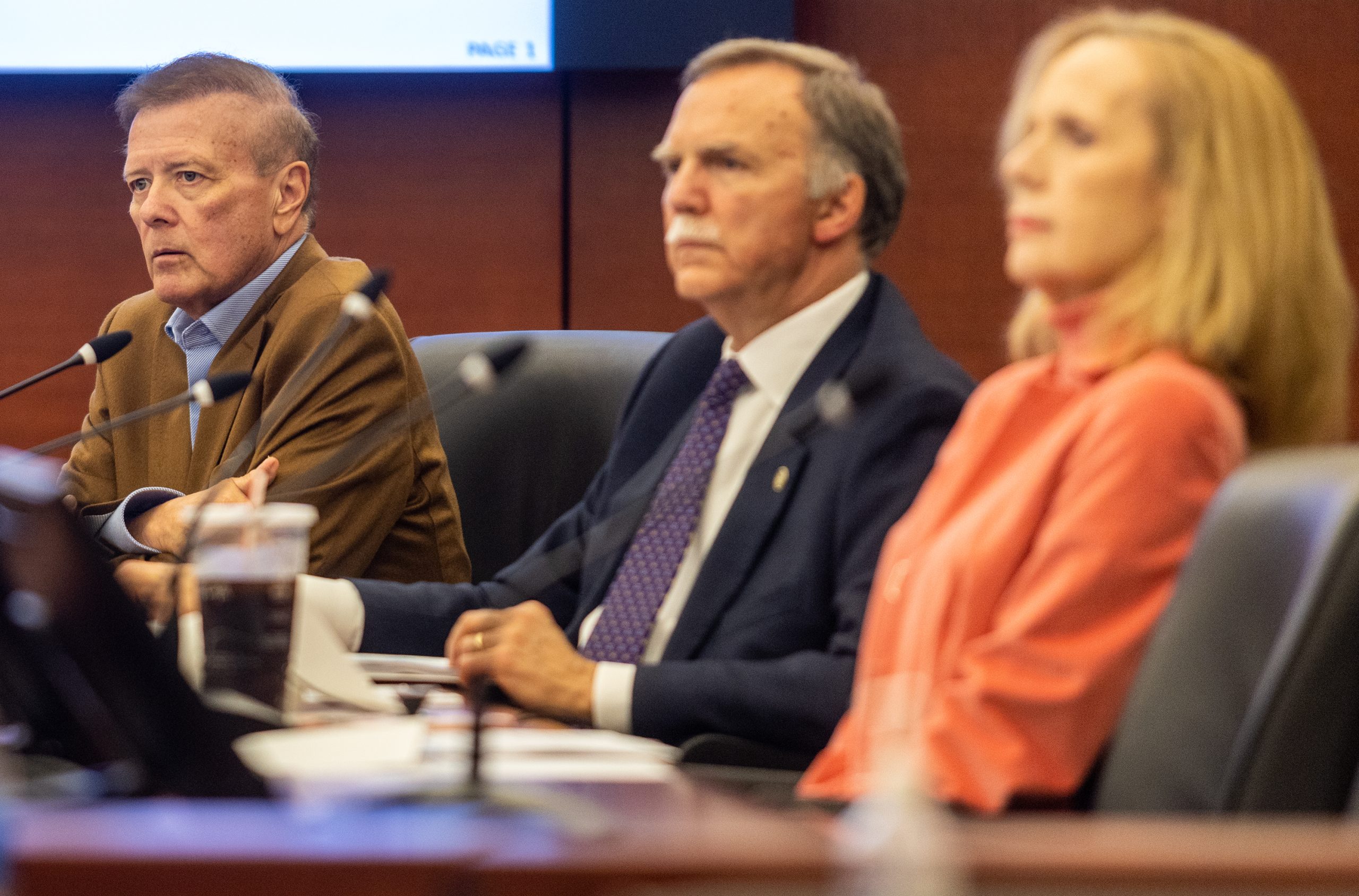Mississippi Today
IHL failed to increase oversight of off-campus programs amid anxiety about looming enrollment cliff

The board overseeing Mississippi public universities failed to pass a series of policy changes in November that would have increased its oversight of off-campus degree programs following months of unusually spirited discussion for the typically rehearsed public body.
The trustee pushing the changes said the new policies would address an issue of growing concern among higher education officials in Mississippi: Larger and better-resourced universities moving into the geographic area of regional colleges and forcing direct competition for a decreasing pool of in-state college students.
For example, Mississippi State University announced in October that it was launching the Gulf Coast Aquatic Health Laboratory, an expansion of its offerings in what has been traditionally considered the University of Southern Mississippi’s backyard.
Mississippi’s eight public universities currently have wide latitude to move on-campus degree programs offsite — think of Mississippi State University’s Meridian campus — even if those programs tiptoe into a region of the state another school traditionally recruits in.
Under the board’s existing policies, universities seeking to set up new off-campus programs are supposed to do so “without unnecessary program duplication in the same geographic area.” If another institution is within 50 miles of a university’s proposed program, the two schools are directed to discuss the conflict and possibly obtain mediation from IHL, but it’s unclear what criteria IHL uses to make a decision.
When the number of high school graduates in Mississippi begins to decline in 2025, this could become a problem, according to Trustee Gee Ogletree, an attorney and a University of Southern Mississippi alumnus.
So in April, Ogletree started working on policy changes that would have required every university to receive approval from the IHL board before moving already-approved programs off-campus, with the idea that trustees would yay or nay requests based on “objective criteria” that factors in the best interest of the university system.
The proposal would result in months of back-and-forth that culminated in a confusing vote against the changes at the board’s November meeting.
Ogletree, who told Mississippi Today he had nothing to add to statements he has made at public meetings, introduced the changes in September during the board’s annual retreat at the White House Hotel in Biloxi, 170 miles from the board’s usual Jackson meeting place. As is typical for these retreats, it was not attended by any member of the public except a Mississippi Today reporter.
But two trustees — both Mississippi State alums — had some questions. A spirited discussion ensued.
“One is, what is the intent of this?” asked Hal Parker, a businessman who founded a successful fiberglass insulation distribution company. “Are there issues that we’ve neglected in the past, or?”
This policy could become “political,” Parker added, something Ogletree said he didn’t foresee happening.
“Can I ask a question? Why do we really need this,” said Bruce Martin, the president of an insurance agency, a few minutes later. “I’m having trouble understanding what the issue is that we need to solve.”
“Well,” Ogletree replied, “as I had indicated earlier, if I have some holes in my yard, I don’t wait till I step into them and break my leg before I fill the hole—”
“Gee, I’m not interested in what can,” Martin interrupted. “Has anything happened that makes this an issue?”
“Yes, what has happened, as we’re all aware, is that we will have over the next decade much fewer traditional students,” Ogletree stated, adding that he thought the board would be abdicating its responsibility to be a good steward of state dollars if it permitted the universities to duplicate off-campus programs without more oversight.
It did not convince Martin who said he believed the universities currently must “work to have the best programs” and that Ogletree’s policies sounded like “protectionism which I would not be in favor of.”
“It seems to me what we’re doing is not providing freedom of choice for the people and giving people all the opportunities,” Martin said.
The three trustees also sparred over whether the most powerful president in the university system — MSU’s Mark Keenum — was on board. The September meeting was on a Thursday. Ogletree said when he spoke to Keenum that Monday, Keenum was supportive. But Parker said when he spoke to Keenum the day before the board meeting, Keenum had concerns.
Martin did not respond to an inquiry from Mississippi Today, and Parker said he thought the policies were not needed because “the intrusion on IHL universities into the territory of other IHL universities” is protected by the board’s existing policies.
This dispute could have easily gone down between trustees who had graduated from any school in the university system. When the University of Mississippi expanded its Oxford-based nursing program offerings earlier this year, there were concerns that it would draw students away from Delta State University. In Natchez, Southern Mississippi used to have a nursing program that the board transferred to Alcorn State University in 1977.
By the time Ogletree reintroduced the policies in November, the IHL board staff had made some edits. A phrase was removed that would have directed the commissioner to develop guidelines that considered the “potential harm to existing similar degree-granting academic programs.” But the bulk of the policy remained the same.
It was approved for a first reading during the regular meeting. Then, before the board adjourned, Parker asked for a motion to reconsider, then a roll call vote.
Parker’s motion passed. But there was some initial confusion. Van Gillespie, the board attorney, asked the board to redo the vote so the secretary could accurately take notes.
Ogletree, who read a statement about why he disagreed with the board, made a motion to let the vote stand.
“I understand we’re a democracy and that majority rules,” he said. “I’ve counted the votes and I understand those. In this case I simply don’t think the majority is correct.”
This article first appeared on Mississippi Today and is republished here under a Creative Commons license.
Mississippi Today
Mississippi lawmakers end 2025 session unable to agree (or even meet about) state budget: Legislative recap
Infighting between Mississippi’s Republican House and Senate legislative leaders reached DEFCON 4 as the 2025 legislative session sputtered to a close last week.
Lawmakers gaveled out unable to set a $7 billion state budget — their main job — or to even agree to negotiate. Gov. Tate Reeves will force them back into session sometime before the end of the fiscal year June 30. At a press conference last week, the governor assured he would do so but did not give a timetable, other than saying he plans to give lawmakers some time to cool off.
The crowning achievement of the 2025 session was passage of a tax overhaul bill a majority of legislators accidentally voted for because of errors in its math. House leaders and the governor nevertheless celebrated passage of the measure, which will phase out the state individual income tax over about 14 years, more quickly trim the sales tax on some groceries to 5% raise the tax on gasoline by 9 cents a gallon, then have automatic gas tax increases thereafter based on the cost of road construction.
The error in the Senate bill accidentally removed safeguards that chamber’s leadership wanted to ensure the income tax would be phased out only if the state sees robust economic growth and controls spending.
The rope-a-dope the House used with the Senate errors to pass the measure also stripped a safeguard House leaders had wanted: a 1.5 cents on the dollar increase in the state’s sales tax, which would have brought it to 8.5%. House leaders said such an increase was needed to offset cutting more than $2 billion from the state’s $7 billion general fund revenue by eliminating the income tax, and to ensure local governments would be kept whole.
Reeves was nonplussed about the flaws in the bill he signed into law (at one point denying there were errors in it) and called it “One big, beautiful bill,” borrowing a phrase from President Donald Trump.
Quote of the Week
“Quite frankly, I think it’s chicken shit what they did.” — Gov. Tate Reeves, at a press conference last week when asked his thoughts about the Senate rejecting his nomination of Cory Custer, Reeves’ deputy chief of staff, to serve as four-year term on the board of Mississippi Public Broadcasting.
Full Legislative Coverage
What happened (or didn’t) in the rancorous 2025 Mississippi Legislative session?
Mississippi Today’s political team unpacks the just ended — for now — legislative session, that crashed at the end with GOP lawmakers unable to pass a budget after much infighting among Republican leaders. The crowning achievement of the session, a tax overhaul bill, was passed by accident and full of major errors and omissions. Listen to the podcast.
Gov. Tate Reeves, legislative leaders tout tax cut, but for some, it could be a tax increase
Many of those retirees who do not pay an income tax under state law and other Mississippians as well will face a tax increase under this newly passed legislation touted by Reeves and others. Read the column.
Trump administration slashes education funding. Mississippi leaders and schools panic
Mississippi schools and the state education system are set to lose over $137 million in federal funds after the U.S. Department of Education halted access to pandemic-era grant money, state leaders said this week. Read the story.
Gov. Tate Reeves says he’ll call Mississippi lawmakers back in special session after they failed to set budget
Gov. Tate Reeves on Thursday said he will call lawmakers into a special session to adopt a budget before state agencies run out of money later in the summer and hinted he might force legislators to consider other measures. Read the story.
GOP-controlled Senate rejects governor’s pick for public broadcasting board. Reeves calls it ‘chicken s–t’
The Senate on Wednesday roundly rejected the nomination of Cory Custer, Reeves’ deputy chief of staff, to serve a four-year term on the board of directors of Mississippi Public Broadcasting, the statewide public radio and television network. Reeves reacted to the Senate’s vote on Thursday, calling it “chicken shit.” Read the story.
Early voting proposal killed on last day of Mississippi legislative session
Mississippi will remain one of only three states without no-excuse early voting or no-excuse absentee voting. Read the story.
Mississippi Legislature ends 2025 session without setting a budget over GOP infighting
The House on Wednesday voted to end what had become a futile legislative session without passing a budget to fund state government, for the first time in 16 years. The Senate is expected to do the same on Thursday. Read the story.
Mississippi Legislature approves DEI ban after heated debate
Mississippi lawmakers have reached an agreement to ban diversity, equity and inclusion programs and a list of “divisive concepts” from public schools across the state education system, following the lead of numerous other Republican-controlled states and President Donald Trump’s administration. Read the story.
Fear and loathing: Legislative session crashes with lawmakers unable to set a budget because of Republican infighting
Republican Lt. Gov. Delbert Hosemann and other Senate leaders on Saturday excoriated the Republican House leadership, after the House didn’t show up for what was supposed to be “conference weekend” to haggle out a $7 billion budget. Read the story.
‘We’ll go another year’ without relief: Pharmacy benefit manager reform likely dead
Hotly contested legislation that aimed to increase the transparency and regulation of pharmacy benefit managers appeared dead in the water Tuesday after a lawmaker challenged the bill for a rule violation. Read the story.
This article first appeared on Mississippi Today and is republished here under a Creative Commons Attribution-NoDerivatives 4.0 International License.
The post Mississippi lawmakers end 2025 session unable to agree (or even meet about) state budget: Legislative recap appeared first on mississippitoday.org
Mississippi Today
On this day in 1909, Matthew Henson reached the North Pole
April 6, 1909

Matthew Henson reached the North Pole, planting the American flag. Traveling with the Admiral Peary Expedition, Henson reportedly reached the North Pole almost 45 minutes before Peary and the rest of the men.
“As I stood there on top of the world and I thought of the hundreds of men who had lost their lives in the effort to reach it, I felt profoundly grateful that I had the honor of representing my race,” he said.
While some would later dispute whether the expedition had actually reached the North Pole, Henson’s journey seems no less amazing.
Born in Maryland to sharecropping parents who survived attacks by the KKK, he grew up working, becoming a cabin boy and sailing around the world.
After returning, he became a salesman at a clothing store in Washington, D.C., where he waited on a customer named Robert Peary. Pearywas so impressed with Henson and his tales of the sea that he hired him as his personal valet.
Henson joined Peary on a trip to Nicaragua. Impressed with Henson’s seamanship, Peary made Henson his “first man” on the expeditions that followed to the Arctic. When the expedition returned, Peary drew praise from the world while Henson’s contributions were ignored.
Over time, his work came to be recognized. In 1937, he became the first African-American life member of The Explorers Club. Seven years later, he received the Peary Polar Expedition Medal and was received at the White House by President Truman and later President Eisenhower.
“There can be no vision to the (person) the horizon of whose vision is limited by the bounds of self,” he said. “But the great things of the world, the great accomplishments of the world, have been achieved by (people with) … high ideals and … great visions. The path is not easy, the climb is rugged and hard, but the glory at the end is worthwhile.”
Henson died in 1955, and his body was re-interred with full military honors at Arlington National Cemetery. The U.S. Postal Service featured him on a stamp, and the U.S. Navy named a Pathfinder class ship after him. In 2000, the National Geographic Society awarded him the Hubbard Medal.
This article first appeared on Mississippi Today and is republished here under a Creative Commons Attribution-NoDerivatives 4.0 International License.![]()
Mississippi Today
A win for press freedom: Judge dismisses Gov. Phil Bryant’s lawsuit against Mississippi Today
Madison County Circuit Court Judge Bradley Mills dismissed former Gov. Phil Bryant’s defamation lawsuit against Mississippi Today on Friday, ending a nearly two-year case that became a beacon in the fight for American press freedom.
For the past 22 months, we’ve vigorously defended our Pulitzer Prize-winning reporting and our characterizations of Bryant’s role in the Mississippi welfare scandal. We are grateful today that the court, after careful deliberation, dismissed the case.
The reporting speaks for itself. The truth speaks for itself.
This judgment is so much more than vindication for Mississippi Today — it’s a monumental victory for every single Mississippian. Journalism is a public good that all of us deserve and need. Too seldom does our state’s power structure offer taxpayers true government accountability, and Mississippians routinely learn about the actions of their public officials only because of journalism like ours. This reality is precisely why we launched our newsroom nine years ago, and it’s why we devoted so much energy and spent hundreds of thousands of dollars defending ourselves against this lawsuit. It was an existential threat to our organization that took time and resources away from our primary responsibilities — which is often the goal of these kinds of legal actions. But our fight was never just about us; it was about preserving the public’s sacred, constitutional right to critical information that journalists provide, just as our nation’s Founding Fathers intended.
Mississippi Today remains as committed as ever to deep investigative journalism and working to provide government accountability. We will never be afraid to reveal the actions of powerful leaders, even in the face of intimidation or the threat of litigation. And we will always stand up for Mississippians who deserve to know the truth, and our journalists will continue working to catalyze justice for people in this state who are otherwise cheated, overlooked, or ignored.
We appreciate your support, and we are honored to serve you with the high quality, public service journalism you’ve come to expect from Mississippi Today.
READ MORE: Judge Bradley Mills’ order dismissing the case
READ MORE: Mississippi Today’s brief in support of motion to dismiss
This article first appeared on Mississippi Today and is republished here under a Creative Commons Attribution-NoDerivatives 4.0 International License.
-

 Mississippi Today6 days ago
Mississippi Today6 days agoPharmacy benefit manager reform likely dead
-

 News from the South - Alabama News Feed7 days ago
News from the South - Alabama News Feed7 days ago'I think everybody's concerned': Mercedes-Benz plant eyeing impact of imported vehicle tariffs
-

 News from the South - Florida News Feed6 days ago
News from the South - Florida News Feed6 days agoFlorida special election results: GOP keeps 2 U.S. House seats in Florida
-

 News from the South - South Carolina News Feed4 days ago
News from the South - South Carolina News Feed4 days agoSouth Carolina clinic loses funding due to federal changes to DEI mandates
-

 Mississippi Today6 days ago
Mississippi Today6 days agoRole reversal: Horhn celebrates commanding primary while his expected runoff challenger Mayor Lumumba’s party sours
-

 News from the South - Kentucky News Feed5 days ago
News from the South - Kentucky News Feed5 days ago3 killed in fiery Lexington crash temporarily shuts down portion of New Circle Road
-

 News from the South - Louisiana News Feed6 days ago
News from the South - Louisiana News Feed6 days agoMother turns son's tragedy into mental health mission
-

 News from the South - Alabama News Feed6 days ago
News from the South - Alabama News Feed6 days agoWill Alabama Lawmakers Cut Taxes on Overtime Pay or Groceries? | April 1, 2025 | News 19 at 6 p.m.

















































